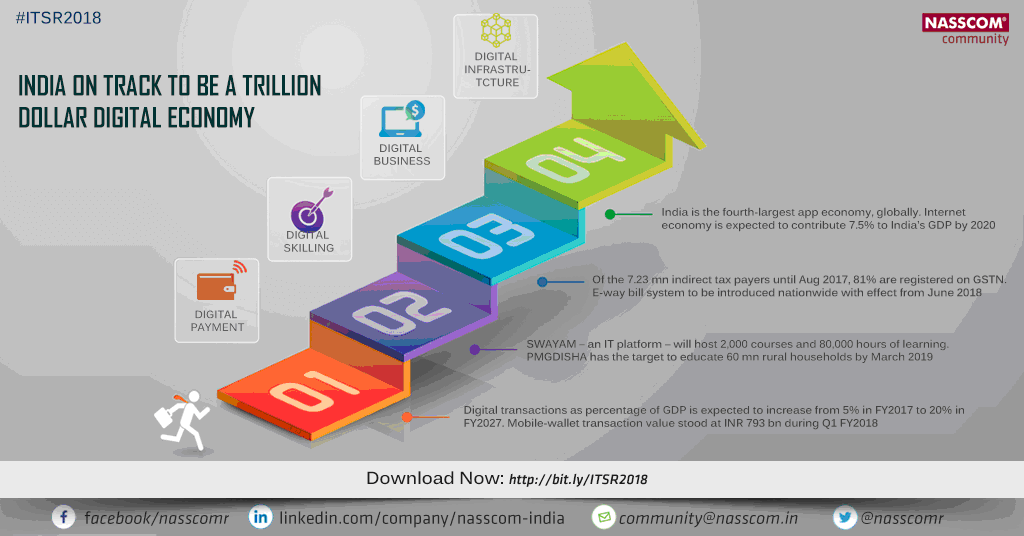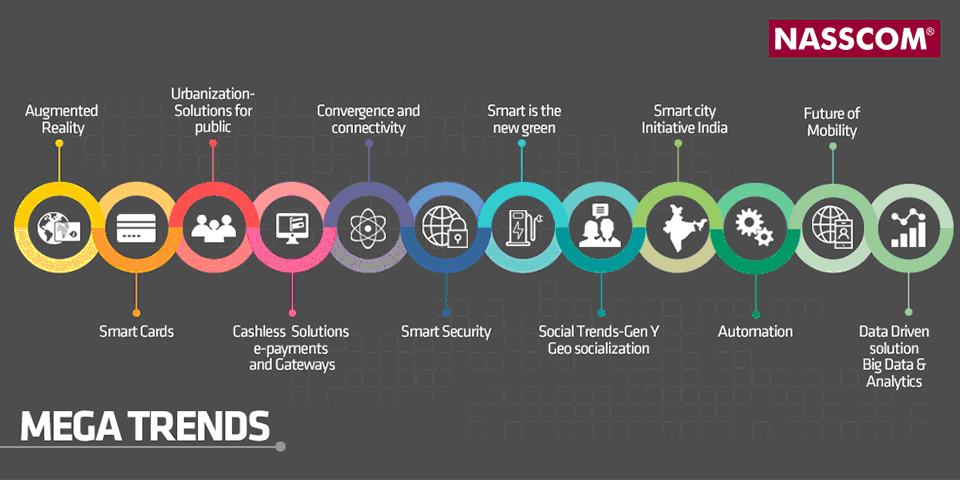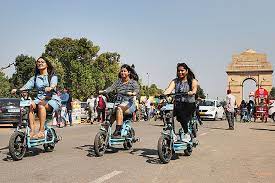India has always had deep cultural relationship with STEM (science, technology, engineering and mathematics). This relationship has allowed India (and Indians) to thrive as a key contributor to the global innovation and a technology disruption worldwide driven by emigration and settlement worldwide to drive innovation and discovery worldwide. This pursuit for deeper understanding of STEM has also prepared it to capitalize on this set of skills back at home.
Last three decades: from the with late 70’s to 2000’s, India acted as R&D offset center supporting many disruptions to occur in developed and mature economies. This mushroomed the local ecosystem and education infrastructure to thrive with young work force developing highly technical skill set in mathematics and software that enabled India to be prepared for the tech tsunami to come in the next two decades. This formed the basis for India to grow financially from 1.14 Tr GDP to roughly 2.49 Tr currently. The IT sector contribution to the GDP grew from 1.2% in 1998 to 7.7% in 2017. The US-India IT export partnership was a key driver for this growth and accounted for 60% of the IT services export.
Enter 21st century: Core technology disruptions occurred in key geographical pockets such as Silicon Valley and brought the advent of internet, mobility and cloud infrastructure worldwide including India over these the next 10 years. This reduced the barriers for the already highly technical software young force to take advantage of their skills to solve massive business model problems locally. Over the last decade between 2010 to 2020, India has established itself as the third largest startup ecosystem especially disrupting B2B enterprise sector, BFSI, Ed Tech, HR Tech sectors. In addition, Multinational and global conglomerates have setup R&D centers in India to tap into this talent pool. The basic infrastructure of cloud, mobility and tech expertise created the perfect storm for Indian entrepreneurs to address massive scale problems using software primarily disrupting business models Vs core technology disruptions (like is normal in Silicon Valley).

Unknowingly the entrepreneurs were solving massive scale business problems in India with economies of scale that ended up solving global problems as the fundamental unit economic model that was already built to scale into the business model disruptions. This has allowed “India first” companies to become truly global companies allowing them to solve global business problems.
We started to think about our first fund about four years back to bring Silicon Valley “early -stage” venture investment mindset and to invest in early-stage SaaS companies that are “India first, but global next” companies right from the get-go.
We expect the Indian entrepreneur/startup landscape is in the process of transition from a SaaS focused play (catering primarily to deliver services to masses and enterprises) to a more product delivery model where in the startups will start to carve out niche and identify ways to add value to the existing value chain and to their customers and delivering more than a service.
The best is yet to come, and the perfect storm is brewing… literally. Global climate crisis is now front and center. We @ RiSo Capital believe that the stars are yet again aligned to uniquely position India to work side by side with developed nations to solve some of the biggest challenges facing humankind. Climate crisis, carbon emissions, mass transport, move to Electric vehicles, clean energy and healthcare to name a few that are facing right at us.

As part of our first fund, we have already invested in three extraordinary entrepreneurs that are already providing solutions to help with some of these challenges.
ION Energy’s technology leverages software analytics and AI to significantly improve battery performance. Battery Makers and OEMs use the platform to accelerate the development of their battery management systems. It also recently received investment from for Amazon Climate fund further validating our thesis that Indian startups are solving global problems.
Zypp Electric is India’s leading B2B Delivery and shared mobility solution provider. Zypp is working to convert all deliveries for e-commerce, grocery, medicine, and food vertical to go electric with e-scooter sharing app. Making last mile delivery more affordable, timesaving and with zero-emission. Zypp started with solving problems at scale locally with Delhi with one of the highest air pollution rates in the world. With local unit economics making them versatile to take this solution to other cities in India and countries in South Asia and elsewhere that are facing similar problems.
Freighify – allows international freight to pick the most optimum route to reduce overall internal marine cargo congestions which is a big contributor to greenhouse emissions. Already part of the Maersk network and working to address global freight congestion. According to international maritime organization (IMO) Co2 emissions from shipping were equal to 2.2% of the global human made emissions and is expected to raise 50 to 250% by 2050 if no action is taken. While Maersk and larger container companies are committing to fleet decarbonization, Freightfy is solving congestion and efficiencies of shipping routes thereby indirectly addressing global climate goals.
We are super excited at what’s next for the world as not all hope is lost, and we will continue to invest in companies and entrepreneurs that will continue to bring global impact. This will form the basis for the next growth chapter and we are excited at the prospects! More on this at a later blog! Do check in and send us a note
Sri Purisai
Founder and General Partner, RiSo Capital



